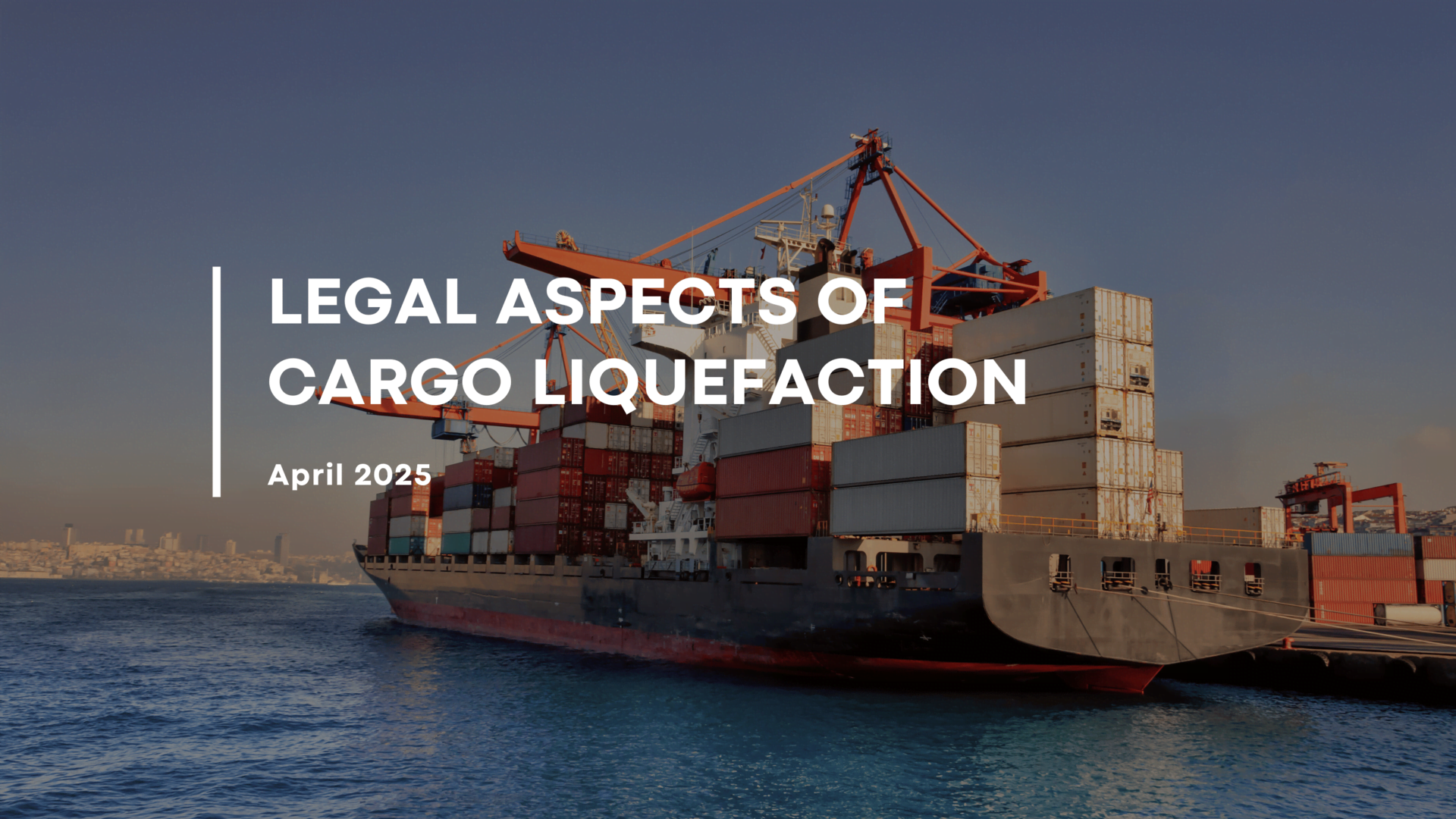A. Introduction
Cargo liquefaction refers to the ability for certain dry cargo such as iron ore fines, nickel ores and various mineral concentrates, to transform from a solid to a semi-liquid state. This change in a ship’s contents during a voyage affects its stability due to the ‘free surface effect’ and ‘cargo shift’, increasing the risk of the vessel capsizing. This risk brings about several technical and legal considerations ranging from the charterer’s rights and responsibilities in ensuring the safety of potentially liquefiable cargoes, to the shipowner’s rights and responsibilities in safely maintaining and loading cargoes.
This article explores the legal implications of cargo liquefaction by analysing the legal framework designed to address this issue.
B. Scope of Legal Disputes/Claims Arising Out of Liquefaction of Bulk Cargoes
Legal disputes arising out of incidents of cargo liquefaction can be classified as either direct or indirect.
- Indirect: Where cargo liquefaction does not even occur at all; the claims arise due to the threat of cargo liquefaction.
- Direct: Claims arise directly from cargo liquefaction i.e. damage claims or compensation of life claims where loss is suffered from a cargo liquefaction.
Indirect disputes (Pre-loading disputes) often arise as the safety of the cargo, regarding its actual moisture content, becomes questionable. The conflict often arises between the shipper and the owners due to a delay in loading which often raises demurrage or off-hire claims. Claims are also made for expenses incurred by either party in verifying the safety of the cargo, for example costs resulting from hiring an independent marine surveyor.
Direct disputes (Post-loading disputes) are, like indirect disputes, between the shipper and owner due to failure to care for the cargo causing the cargo to liquefy or that the damage was caused by the dangerous cargo that the shipper tried to ship without the carrier’s/master’s knowledge.
C. Rules and regulations for prevention of cargo liquefaction
There are several rules and regulations which prescribe necessary safety procedures for the prevention of cargo liquefaction. While some of the laws do not apply to solid bulk cargoes and cargo liquefaction specifically, they are discussed here as they give an overall view of the law.
1. The International Convention for the Safety of Life at Sea (SOLAS) 1974
The International Convention for the Safety of Life at Sea (SOLAS) 1974 is widely regarded as the most important of all international treaties concerning the safety of merchant ships. It sets out the minimum standards for the construction, equipment and operation of ships. Enforcement of SOLAS requirements is made by the appropriate Flag State, The Convention issues certifications as evidence of compliance. The SOLAS covers, among other things, decisions concerning safe navigation and the marine environment, carriage of cargoes, and additional safety measures for bulk carriers.
2. Code of Practice for the Safe Loading and Unloading of Bulk Carriers (BLU Code)
Regulation 7 of Chapter VI of SOLAS specifically directs the master and the terminal representative to refer to the BLU Code when handling solid bulk cargoes. The objective of the BLU code is to provide guidance to owners and masters of bulk carriers, charterers, terminal operators, and other concerned parties for the safe handling, loading and unloading of solid bulk cargoes.
It is a comprehensive guide for the loading and unloading of bulk cargoes, detailing all the information that is obligated to be exchanged between the ship and the terminal prior to arrival and any loading operations.
3. International Maritime Solid Bulk Cargoes (IMSBC) code and amendments
As the International Maritime Organisation’s (IMO) official response to situations caused by cargo liquefaction is fundamental in determining the outcome of disputes where cargo liquefaction is involved, observance of the IMSBC code is crucial. The IMSBC code and amendments incorporates the needs and dangers highlighted by the IMO. The mandatory provisions governing the carriage of solid bulk cargoes provided in Chapter VI of SOLAS are extended in this code.
D. Analysis
While the legal framework provides guidance on preventing cargo liquefaction, certain critical areas remain insufficiently addressed:
- The scientific understanding of cargo liquefaction remains incomplete, as the exact causes of why certain solid bulk cargoes transition into a liquid-like state under specific conditions are still being studied.
- The IMSBC Code’s classification system only includes cargo types that have already been identified as prone to liquefaction, meaning new risks are only addressed after incidents occur.
- The current system is largely reactive, with amendments made only when new discoveries force regulatory changes.
- Although compliance with the IMSBC Code is mandatory, its enforcement is inconsistent due to the variations in national laws and regulatory frameworks across different jurisdictions, leading to loopholes in implementation.
- When cargo is lost at sea due to liquefaction-related incidents, the lack of available data makes it difficult to establish whether non-compliance with safety regulations was a contributing factor.
- There is no clear guidance on who bears the burden of proof in cases involving liquefaction-related cargo losses, creating legal uncertainty on whether it is the responsibility of the shipper, carrier, or another party to establish compliance or non-compliance.
- Since enforcement authorities often lack the necessary oversight mechanisms, shippers can potentially evade responsibility by exploiting legal and procedural ambiguities, making regulatory enforcement ineffective.
- One of the most pressing concerns is the prevalence of forged certificates and inaccurate declarations by shippers regarding the moisture content of bulk cargo, which is a critical factor in preventing liquefaction.
- Due to the absence of strict verification procedures and independent checks, regulatory loopholes continue to allow the submission of falsified or unreliable safety documentation, increasing the risk of liquefaction-related maritime disasters.
- In cargo liquefaction disputes, it could be assumed that by loading the cargo onto the vessel, the Master has either waived the Owners’ rights to bring a claim in respect of the affected cargo or accepted the risks and liabilities associated with said cargo.
- While charterers may not want to absorb the liabilities of rejecting a cargo, it is unlikely that the master/carrier will be held liable provided that they have exercised their duties in ensuring that liquefiable cargo have not been loaded onto the vessel. As noted above, the master/carrier is entitled legally to reject a cargo which is subsequently found to be safe to carry if they determined them to be unsafe based on the necessary checks.
- It is because of the lack of understanding of the phenomenon that is cargo liquefaction, which is compounded by an inadvertent or, occasionally, deliberate misrepresentation of important details and information about cargoes by shippers and others that incidents occur.
E. Case Studies
1. Bulk Jupiter
Bulk Jupiter sank on 2 January 2015 off the coast of Vietnam with a cargo of 46,400 tons of bauxite. The investigation report by the Flag State Authority, Bahamas Maritime Authority (BMA), revealed that an email from the weather routing provided flagging the weather conditions in the region was sent and received by the vessel. It also showed an average moisture content of 21.3%. The Master had failed to consider the extreme weather conditions and conduct an independent inspection which would have directly prevented the liquefaction and thus the unfortunate sinking of the vessel. The cargo was loaded without a check confirming its match with the IMSBC Code parameters.
2. Nur Allya
A bulk carrier transporting nickel went missing in August 2019 near the islands of Indonesia. The likely cause of which was deemed to be cargo liquefaction. In a press release by Intercargo, the association expressed frustration at the lack of consolidated efforts and commitment from all stakeholders towards the elimination of problems like cargo liquefaction.
F. Developments
1. IMBSC Code Amendments (02-13 & 03-13)
The amendments to the International Maritime Solid Bulk Cargoes (IMBSC) Code improve information reliability by requiring shippers to implement procedures for testing, sampling, and controlling moisture content in cargoes that may liquefy. They also refine the definition of “Competent Authority” to ensure it is independent and keep cargo schedules up to date.
2. SOLAS Regulation Amendments
New requirements under the International Convention for the Safety of Life at Sea (SOLAS) mandate that cargo ships (excluding bulk carriers and tankers) built from 1 January 2024 onwards must have water level detectors in each cargo hold. This is a safety measure to detect flooding early and prevent accidents.
3. BIMCO’s Charter Party Clause (2012)
BIMCO (Baltic and International Maritime Council) introduced a ‘Solid Bulk Cargoes that Can Liquefy Clause’ for charter parties in 2012. This clause clarifies the rights and obligations of shippers, charterers, and owners when transporting cargoes that may liquefy. It helps prevent disputes, delays, and losses by addressing practical enforcement challenges.
4. DNV GL Guidelines & BCLIQ Notation
(i) 2015 Guidelines: DNV GL (a classification society) released guidelines on vessel design and operation to handle bulk cargoes that may liquefy.
(ii) 2018 BCLIQ Notations: The Bulk Cargo Liquefaction (BCLIQ) notations were introduced to certify ships as compliant with the IMBSC Code’s liquefaction requirements, ensuring they are designed and operated safely.
G. Conclusion
While there are some laws implemented to address the dangers of cargo liquefaction, they remain insufficient. It is imperative that parties are aware of their roles, responsibilities, and their potential liabilities during the loading and voyage phases of transporting solid bulk cargoes.
This article was prepared with the assistance of our intern, Kshithi M. Shetty. The firm extends our sincere appreciation for her valuable contributions to this article.
© PDLegal LLC
This article is intended to provide general information only and does not constitute legal advice. It should not be used as a substitute for professional legal consultation. We recommend seeking legal advice before making any decisions based on the information available in this article. PDLegal fully disclaims responsibility for any loss or damage which may result from relying on this article.
Further information
Should you have any questions on the legal aspects of cargo liquefication or how this development may affect you or your business, please get in touch with the following person:
Contributed by:
Chambers & Partners – Asia Pacific 2023
PDLegal LLC is pleased to announce that Managing Partner, Peter Doraisamy, has been recognised and ranked by Chambers & Partners (Asia Pacific 2023 for Shipping: Domestic: Litigation). The following quotes appear with Peter’s ranking: –
“Peter Doraisamy of PDLegal in Singapore is a noted shipping lawyer in the market. He handles a wide range of disputes, including ship grounding, cargo and fraud-related cases” – Chambers & Partners – Asia Pacific 2023
“He is excellent in litigation. He has very good control of the case, collecting the right evidence and putting this into a very successful trial.” – Shipping Litigation Client
Chambers and Partners is the leading independent professional legal research company operating across 200 jurisdictions. Chambers and Partners delivers detailed rankings and insights into the world’s leading lawyers and law firms.
This ranking is a testimony to the expertise and experience of the Firm’s shipping practice and would not be possible without the support of our clients and friends.
View All Awards

We’re here to help you.
Whether you're seeking advice, representation, or have general inquiries, we're here to help. if you would like to speak to us for more information, please contact our client services team who will be happy to assist.
Let's Get In Touch
Our Office
- A:
PDLegal LLC Advocates & Solicitors 1 Coleman Street #08-02 The Adelphi Singapore 179803
- E:
- T:
- F:
(65) 6220 0392
- H:
Mon - Fri : 9:00 am - 5:00 pm Sat : 8:30 am - 12:00 pm










